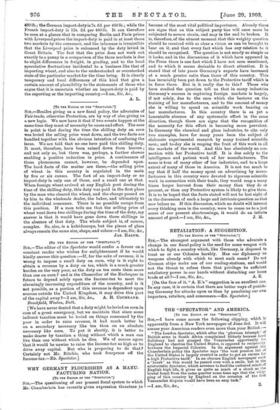[To THE EDITOR OP THE "SPECTATOR.") SIR,—Besides giving us a
new fiscal policy, the advocates of Fair-trade, otherwise Protection, are by way of also giving us a new logic. We now have it that if two events happen at the same time they must of necessity be cause and effect. The case in point is that during the time the shilling duty on corn was levied the selling price went down, and the two facts are handled together with the obvious intention of confusing the issue. We are told that no one here paid this shilling duty. It must, therefore, have been rained down from heaven ; and not only so, but there was, perhaps, a further shower enabling a positive reduction in price. A continuance of these phenomena cannot, however, be depended upon. The hard facts of the matter are these,—the selling price of wheat in this country is regulated in the main by five or six causes. The fact of an import-duty or no import-duty is only one of these, and a small one at that. When foreign wheat arrived at any English port during the time of the shilling duty, this duty was paid in the first place by the man who cleared the wheat, and the charge passed on by him to the wholesale dealer, the baker, and ultimately to the individual consumer. There is no possible escape from this position. If a man tells me that the selling price of wheat went down two shillings during the time of the duty, my
answer is that it would have gone down three shillings in the absence of that duty. The whole subject is, of course, complex. So, also, is a kaleidoscope, but the pieces of glass always remain the same size, shape, and colour.—I am, Sir, &c., JAS. RALPH.










































 Previous page
Previous page